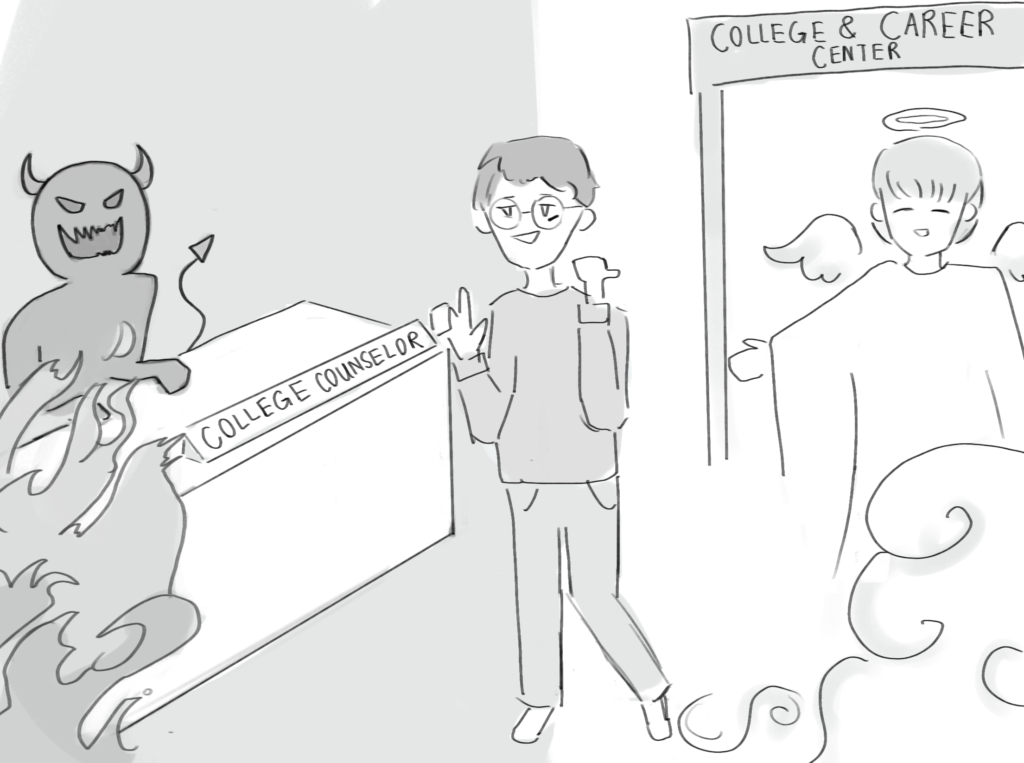This year, the walls of the school’s former community room were plastered with posters of several colleges, following the area’s rebrand to the College and Career Center (CCC). The CCC started as a new initiative to help seniors through the increasingly challenging college application process and to introduce high schoolers to new potential careers.
However, just like its location, this program is still underrated and underutilized. And despite the constant barrage of emails, many students have never attended a single college-related session, usually because they view it as simply yet another school initiative, rather than a useful opportunity they should seize.
Simply put, the CCC is the most cost-effective way to perform well in the admissions process, as opposed to paying thousands of dollars to overpriced private admissions counselors. The CCC creates a welcoming environment that humanizes what is, for many, a convoluted process.
Of course, like lemmings going over the cliff, many students will continue to hire private admissions counselors, hoping that such guidance will give them an edge in the college admissions process. Often, the role of such counselors is to help students finalize a college list, finish their essays and supplementals on time and provide guidance for picking a final college. The CCC covers each of these bases, rendering a private counselor redundant for students who take advantage of its offerings.
Some organizations in the private admissions industry have come under fire in recent years for being incredibly pricey and even unethical. Others have been faulted for making illegal guarantees. Much of the advice they give, pushing students disingenuously toward “research” projects and “nonprofit” organizations, can often be actively harmful to others. Yet, according to the Atlantic, college counselors in the Bay Area — the epicenter of the admissions rat race — charge up to a jaw-dropping $400 per hour.
The school’s new college counselor, Brad Ward, has more than a decade of experience with the college admissions industry and is every bit as knowledgeable as those in the private sector. Furthermore, the four guidance counselors provide individualized support to their assigned students in addition to letters of recommendation.
And how much does the school charge for having a national-level expert such as Ward and a dedicated team of experienced counselors? $0.
Whether by hosting open hour sessions for parents of upperclassmen, by diligently helping students with essays and college selection choices or by inviting admissions officers from dozens of colleges to speak on campus, Ward creates opportunities that provide students with more clarity in the college admissions process.
And while some of these initiatives, such as college representative visits, may have received flak from The Falcon previously, they are a potentially important resource that other private counselors simply cannot replicate without the backing of the school.
Furthermore, the CCC actively provides students with an environment that is not only engaging and productive, but also humanizing and genuine.
Often, in “pay per hour” or “pay per session” schemes, or during trial runs, counselors give advice that is compromised by conflicts of interest. If the counselors are able to convince students that they are inadequate or won’t be able to handle the admissions process alone, then they could potentially convince the student to sign up for more hours or sessions.
In contrast, because the CCC is free to use, it can open students’ minds to appropriate schools that are not so highly ranked, and even destigmatize community college — something that private counselors struggle in due to fear of losing their reputation.
In addition, the CCC has resources extending beyond college admissions, giving students insights into nontraditional paths after high school. While most students here elect to pursue a 4-year college, the CCC works with those thinking about nontraditional paths such as entering the workforce early or joining the military. As many students have not yet been exposed to options like these or are struggling to find competent resources to help them, the CCC is a great place to start.
Ultimately, regardless of what the CCC is used for, students should give the new initiative at least one try before diving straight into costly private services. While this was its first year of full-fledged operation, it is students themselves who must take full advantage of the CCC’s range of vital services.


























